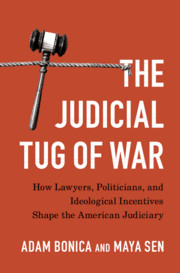 The Judicial Tug of War
The Judicial Tug of War Book contents
- Frontmatter
- Dedication
- Contents
- List of Figures
- List of Tables
- Acknowledgments
- 1 Introduction: The Tug of War Over the American Judiciary
- I The Legal Profession and the “Captured Judiciary”
- II Political Actors and the Incentive to Politicize
- III Ramifications of the Judicial Tug-of-War
- Bibliography
- Index
- Other Books in the Series
1 - Introduction: The Tug of War Over the American Judiciary
Published online by Cambridge University Press: 09 December 2020
- Frontmatter
- Dedication
- Contents
- List of Figures
- List of Tables
- Acknowledgments
- 1 Introduction: The Tug of War Over the American Judiciary
- I The Legal Profession and the “Captured Judiciary”
- II Political Actors and the Incentive to Politicize
- III Ramifications of the Judicial Tug-of-War
- Bibliography
- Index
- Other Books in the Series
Summary
Chapter 1 introduces our argument by considering the important recent case of US Supreme Court Justice Antonin Scalia. When Scalia died in early 2016, the expectation was that then-president Barack Obama would name his successor; however, Senate Republicans fought back and prevented Obama from naming well-respected appeals judge Merrick Garland to the Court. This audacious partisan maneuvering illustrates key questions about the increasing polarization of the courts. For example, why have Republicans blasted “activist judges,” and why do they support attempts at “reforming” the judiciary – even as it risks public criticisms of interjecting partisanship and politicization? On the other side of the spectrum, why have Democrats decried Republicans’ tactics, choosing to focus instead on ostensibly nonpartisan characteristics such as pedigree and experience? Our answer to these questions is a new framework for thinking about our nation’s courts – the judicial tug of war. The judicial tug of war not only explains current political clashes over America’s courts ¬– such as the fight over Scalia’s seat – but also explains the balance of power between party leaders and the nation’s lawyers. We use this framework to explain the important question of how the courts have increasingly become a highly sought-after political prize.
- Type
- Chapter
- Information
- The Judicial Tug of WarHow Lawyers, Politicians, and Ideological Incentives Shape the American Judiciary, pp. 1 - 28Publisher: Cambridge University PressPrint publication year: 2020
